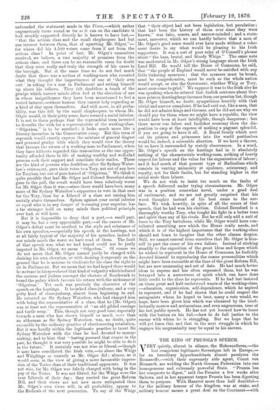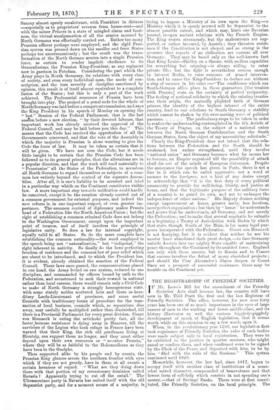THE KING OF PRUSSIA'S SPEECH.
VERY quietly, almost in silence, the Hohenzollerns,—the last competent legitimate Sovereigns left in Europe,— for an hereditary hypochondriasis almost paralyzes the Romanoffs,—with their supremely able agent, Count von Bismarck, are welding the North German Federation into one homogeneous and extremely powerful State. "Prussia has her conquests to digest," said the Premier a few weeks after Sadowa, and in her apparent torpor Prussia has been digesting them to purpose. With Hanover more than half doubtful— for the military honour of the kingdom was at stake, and
the Radicals of the next generation. To say of the Whigs military honour means a great deal on the Continent—with Saxony almost openly recalcitrant, with Frankfort in distress —especially as to proprietors' revenue from house-rent—and with the minor Princes in a state of mingled alarm and fussi- ness, the virtual amalgamation of all the armies manned by North Germans was effectually carried out. Rather too many Prussian officers perhaps were employed, and the rigid Prus- sian system was pressed down on the smaller and freer States perhaps too unceremoniously ; but the result was the trans- formation of the North German armies into a single Prussian force, as certain to render implicit obedience to its Generalissimo, the Prussian King-President, as any regiment now in garrison in Potsdam. Considering the part which the Army plays in North Germany, its relations with every class of society, and even every individual man, the mode of con- scription, and the iron severity of discipline sanctioned by opinion, this result is of itself almost equivalent to a complete fusion of the States ; but this is only a part of the work achieved. The Professorial resources of Prussia have been brought into play. The project of a penal code for the whole of North Germany was laid before a competent commission, and,says the King President in his speech of Monday on opening the " last" Session of the Federal Parliament, that is the last • session before a new election, "by their devoted labours, that important work has already received the approval of the Federal Council, and may be laid before you this day." This means that the Code has received the approbation of all the Governments concerned, and that the vote of the Assembly in which the majority is Prussian is alone wanting to give the Code the force of law. It may be taken as certain that it will be given. We have not seen the Code, but it needs little insight to be certain that the Prussian Code has been followed as to its general principles, that the alterations are in a popular direction, and that the work will tend materially to " Prussianize" all the States of the Federation, to accustom all North Germans to regard themselves as subjects of a com- mon law entirely beyond the control of the separate Assem- blies. After all, it is one's liability to be arrested and tried in a particular way which on the Continent constitutes visible law. A more important step towards unification could hardly be conceived, except it be the creation already carried out of a common government for external purposes, and indeed the new reform is, in one important respect, of even greater im- portance. The common control of diplomacy makes Prussia head of a Federation like the North American Union ; but the right of establishing a common criminal Code does not belong to the Washington Government, except upon the important point of treason, and of itself involves the principle of legislative unity. So does a law for internal copyright, equally valid in all States. So do the more complete laws establishing the common nationality—the word employed in the speech being not "naturalization," but " indigenat," the right inherent in nativity. So finally do the laws perfecting freedom of residence and the common law of poor relief which are about to be introduced, and to which the President has. it is evident, already obtained the sanction of the Federal Council. These laws once passed, the communications placed in one hand, the Army levied on one system, reduced to one discipline, and commanded by officers bound by oath to the Federation, and accustomed to seek their reward in national rather than local careers, there would remain only a Civil Code to make of North Germany a strongly homogeneous state, with some stately nobles scattered here and there as here- ditary Lords-Lieutenant of provinces, and some useful Councils with traditionary forms of procedure for the tran- saction of local business, councils which, as separatism dies away, may usefully be multiplied rather than diminished, till there is a Provincial Parliament for every great division. Count von Bismarck is eating the artichoke pretty fast, all the faster because resistance is dying away in Hanover, till the survivors of the Legion who took refuge in France have been warned that their King, the rich old gentleman living at Hientzig, can support them no longer, and they must either depend upon their own resources or " re-enter Prussia," where they will be as faithful to the Hohenzollerns as they have been to the Guelphs.
Thus supported alike by his people and by events, the Prussian King glances across the southern frontier with eyes which if they are not greedy, have in them at all events a certain keenness of regard. "What are they doing down there with that portion of my reversionary dominion called Bavaria? Apparently trying to cut off the entail." The Mtramontane party in Bavaria has united itself with the old Separatist party, and for a moment secure of a majority, is
trying to impose a Ministry of its own upon the King,—a, Ministry which it is openly avowed will be Separatist to the utmost possible extent, and which may, hints one Bavarian journal, re-open ancient relations with the French Empire. The King resists strenuously, but the malcontents are sup- ported, or rather favoured, by Austria ; they threaten resist- ance if the Constitution is not obeyed, and so strong is the pressure that reports of an abdication are current all over Germany. They may be based only on the well-known fact that King Louis—Shelley on a throne, with endless capacities for everything but reigning—is always willing to enter private life ; but the fight is nevertheless serious enough to interest Berlin, to raise rumours of armed interven- tion, and to cause the King-President to declare not without a ring of menace in his voice :—" The confidence which our South-German allies place in these guarantees [the treaties with Prussia] rests on the certainty of perfect reciprocity. The feeling of national solidarity to which the existing treaties owe their origin, the mutually plighted faith of German- princes, the identity of the highest interest of the entire country, lend to our relations to South Germany a stability which cannot be shaken by the ever-moving wave of political
passions The preliminary steps to be taken in order to realize the understanding contemplated in the 4th Article of the Treaty of Prague, on the subject of a national union between the North German Confederation and the South German States, form the object of my unremitting solicitude."
Clearly the King-President does not intend that the rela- tions between the Federation and the South should be weakened, but rather strengthened, until they involve "national union" and Germany becomes what he means her to become, an Empire organized till the possibility of attack shall die out of the minds of European statesmen. Despite the annoyance the speech has given in Paris, there is not a line in it which can be called aggressive, not a word of menace to the foreigner, not a hint of any desire except to acknowledge that "it is the first duty of every political community to provide for well-being, liberty, and justice at home, and that the legitimate purpose of the military force of a country is to guard its own, and not to endanger the independence of other nations." His Majesty desires nothing except improvement at home, greater unity, less localism, more perfect organization ; but then by " home S' he understands and avows that he -understands, all Germany, and not merely the Federation ; and to make that avowal emphatic he submits as a beginning a Treaty of Jurisdiction with Baden by which that state, though South of the Main, is for many legal pur- poses incorporated with the Federation. Count von Bismarck is not hurrying, but it is evident that neither he nor his master have abandoned their great design,—to fuse German3r outside Austria into one mighty State capable of maintaining peace throughout the Continent by its unaided force. England can only wish them success, but to Russia and to France that success involves the defeat of many cherished projects ; and should the Czar Alexander's illness deepen or Count Darn see a prospect of successful resistance, there may be trouble on the Continent yet.

































 Previous page
Previous page